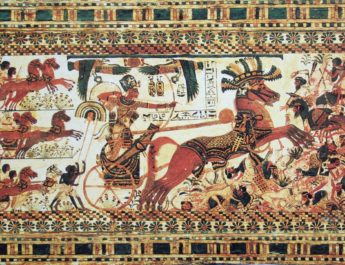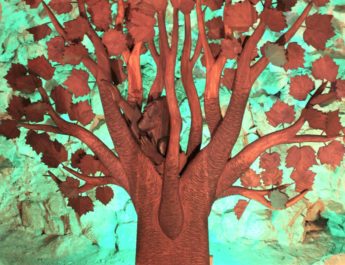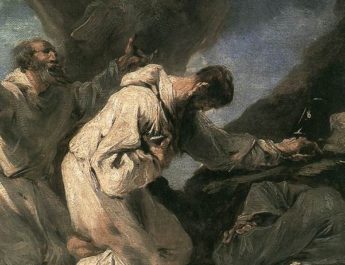Luke 18:1-8
Ordinary C47
1 Then Jesus told them a parableA about their needB to prayC alwaysD and not to lose heart.E
A “parable” = parabole. From paraballo (literally to throw beside, compare, arrive, liken); {from para (by, beside, in the presence of) + ballo (to throw, cast, place, put, drop)}. This is a parable, comparison, adage. Quite often a tale told or a metaphor to establish a point, but it could be a true story.
B “need” = dei. From deo (to tie, bind, compel; declare unlawful). This is what is necessary or proper. It is what is needed or what one should do – a duty or something inevitable. This refers to something absolutely necessary.
C “pray” = proseuchomai. From pros (advantageous for, at, toward) + euchomai (to wish, make a request, pray). This is to pray or pray for, to worship or supplicate. It is more literally exchanging one’s own wishes for God’s.
D “always” = pantote. From pas (all, every, each) + tote (then, whether past or future); {from hote (when); from ho (the)}. This is literally every when. It is always, at all times.
E “lose heart” = ekkakeo. 6x in NT. From ek (from, from out of) + kakos (bad, evil, harm, ill; evil that is part of someone’s core character – intrinsic, rotted, worthless, depraved, causing harm; deep inner malice that comes from a rotten character). This is to be faint, bad, fail, or be weak. It is the aftermath of deep, inner weariness – exhausted or dispirited.
2 He said,F “In a certain cityG there was a judgeH
F “said” = lego. This is to speak, say, name, call, command. It is generally to convey verbally.
G “city” = polis. This is a city or its inhabitants. It is a town of variable size, but one that has walls. This is where “metropolis” and “police” come from.
H “judge” = krites. 19x in NT. From krino (to judge, decide, think good, condemn, determine, pass judgment, stand trial, sue; judging whether in court or in a private setting; properly, mentally separating or distinguishing an issue – to come to a choice or decision, to judge positively or negatively in seeking what is right or wrong, who is innocent or guilty; can imply trying, condemning, punishing, or avenging). This is judge or ruler.
who neither fearedI GodJ nor had respectK for people.L
I “feared” = phobeo. From phobos (panic flight, fear, fear being caused, terror, alarm, that which causes fear, reverence, respect); from phebomai (to flee, withdraw, be put to flight). This is also to put to flight, terrify, frighten, dread, reverence, to withdraw or avoid. It is sometimes used in a positive sense to mean the fear of the Lord, echoing Old Testament language. More commonly, it is fear of following God’s path. This is where the word phobia comes from.
J “God” = Theos. From Proto-Indo-European origins, meaning do, put, place. This is God or a god in general.
K “had respect” = entrepo. 9x in NT. From en (in, on, at, by, with) + trepo (to turn; may imply turn with change). This is to turn. It could be to turn to pay rapt attention to, to turn in shame, recoil, or to turn to in respect.
L “people” = anthropos. Probably from aner (man, male, husband) + ops (eye, face); {from optanomai (to appear, be seen); perhaps from horao (become, seem, appear)}. This is human, humankind. Used for all genders.
3 In that city there was a widowM who kept comingN to him and saying, ‘Grant me justiceO against my accuser.’P
M “widow” = chera. Perhaps from the base of chasma (chasm, gap, gulf); from chasko (to yawn). This is widow literally or figuratively.
N “kept coming” = erchomai. This is to come or go.
O “grant…justice” = ekdikeo. 6x in NT. From ekdikos (to avenge, enact a just punishment or judgment); {from ek (from, from out of) + dike (the principle of justice; that which is right in a way that is very clear; a decision or the execution of that decision; originally, this word was for custom or usage; evolved to include the process of law, judicial hearing, execution of sentence, penalty, and even vengeance; more commonly, it refers to what is right); {may be from deiknumi (to show, point out, exhibit; figurative for teach, demonstrate, make known)}}. This is to defend, vindicate, dole out justice, or avenge. It can also mean retaliate.
P “accuser” = antidikos. Related to “grant…justice” in v3. 5x in NT– 4x meaning opponent in court and 1x referring to Satan. From anti (opposite, instead of, against) + dike (see note O above). This is an opponent or adversary, whether in court or the devil. It is someone bringing former charges and seeking damages.
4 For a whileQ he refused,R but later he said to himself, ‘Though I have no fear of God and no respect for anyone,S
Q “while” = chronos. Time in the chronological sense, quantitative time or a duration of time.
R “refused” = ou + thelo. Thelo is to wish, desire, will, or intend. It is to choose or prefer in a literal or figurative sense. It can also mean inclined toward or take delight in. It can have a sense of being ready to act on the impulse in question.
S “anyone” = anthropos. Same as “people” in v2. See note L above.
5 yet because this widow keepsT botheringU me, I will grant her justice, so that she may not wear me outV by continuallyW coming.’”
T “keeps” = parecho. 16x in NT– including Luke 6:29: “if anyone strikes you on the cheek, offer the other also.” From para (beside, by, in the presence of) + echo (to have, hold, possess). This is present, to show, bring, give, offer to hold near.
U “bothering” = kopos. 18x in NT. From kopto (to cut, strike, cut off; beating the chest to lament and so to mourn). This is trouble, toil, or labor. This is working to the point of exhaustion or weariness. At base, this refers to a blow that lands so swiftly that one is seriously weakened. Figuratively, this is being greatly tired or working to the point of being without strength.
V “wear…out” = hupopiazo. Related to “people” in v2.2x in NT. From hupopion (undereye area); {from hupo (by, under, about, subordinate to) + ops (see note L above)}. This is hitting the undereye area, so to bruise. It can also mean to treat harshly, use torment as discipline. It can be annoy, harass, weary.
W “continually” = telos. From tel– (to reach a goal or aim); This is an end, aim, purpose, completion, goal, consummation, or tax. It is completing a stage of something and everything that results from that completion. It can be literal or figurative.
6 And the LordX said, “ListenY to what the unjustZ judge says.
X “Lord” = Kurios. From kuros (authority, supremacy). This is a respectful address meaning master or sir. It refers to one who has control or power greater than one’s own. So, it was also applied to God and Jesus as Master or Lord.
Y “listen” = akouo. This is hear or listen, but it also means to understand by hearing. This is where the word “acoustics” comes from.
Z “unjust” = adikia. Related to “grant…justice” and “accuser” in v3. From adikos (unjust, unrighteous, wicked, treacherous); {from a (not, without) + dike (see note O above)}. This is injustice, unrighteousness, of some other kind of harm or wrong. It is justice in a legal setting or a morally wrong action or character.
7 And will not God grantAA justiceBB to his chosenCC ones
AA “grant” = poieo. This is to make, do, act, construct, abide, or cause.
BB “justice” = ekdikesis. Related to “grant…justice” and “accuser” in v3 & “unjust” in v6. 9x in NT. From ekdikeo (to defend, vindicate, dole out justice, or avenge. It can also mean retaliate); {from ek (from, from out of) + dike (see note O above)}. This is vengeance, punishment, vindication, or defense.
CC “chosen” = eklektos. Related to “said” in v2. From eklego (to choose, select, elect); {from ek (from, from out of) + lego (see note F above)}. This is to select or choose. It is making a personal choice – a favorite.
who cryDD to him dayEE and night? Will he delay longFF in helping them?
DD “cry” = boao. 12x in NT. From boe (a cry or shout). This is cry out, make a distress call, ask for desperately need assistance.
EE “day” = hemera. Perhaps from hemai (to sit). This is day, time, or daybreak.
FF “delay long” = makrothumeo. 10x in NT. From makros (long, long lasting) {from mekos (length); probably related to megas (great or large)} + thumos (passion, wrath; actions emerging from passion or impulse) {from thuo (to rush along, breathe violently, offer sacrifice)}. This is properly long tempered. It refers to one who delays anger, perseveres, or is patient. One could also say longsuffering or forbearing.
8 I tell you, he will quicklyGG grant justice to them. And yet, when the SonHH of ManII comes,JJ
GG “quickly” = tachos. 8x in NT. From tachus (quickly, promptly; without unreasonable delay). This is quickly or immediately. It is not rushed, but as fast as is reasonable.
HH “Son” = Huios. This is son, descendant – a son whether natural born or adopted. It can be used figuratively for other forms of kinship.
II “Man” = anthropos. Same as “people” in v2. See note L above.
JJ {untranslated} = ara. 18x in NT. From ara (then, since); {perhaps related to aro (to join) or from airo (raise, take up, lift, remove)}. This is a word that cannot be translated. However, it implies a question made from one who is worried or impatient. It can also be surprise or an urgent need for an answer.
will he findKK faithLL on earth?”MM
KK “find” = heurisko. This is to find, learn, or obtain. It is to discover something, which generally implies a period of searching for it. This is to find in a literal or figurative sense. This is where the word “heuristic” comes from.
LL “faith” = pistis. From peitho (to have confidence, urge, be persuaded, agree, assure, believe, have confidence, trust). This is less about knowing, believing, and repeating a list of doctrines then it is about trusting God. Faith means listening to God and seeking to live a holy life even (and especially) when we don’t understand how everything works or fits together. Faith is about being faithful (trusting and doing) rather than being all knowing.
MM “earth” = ge. This is earth, land, soil, region, country, the inhabitants of an area.
Image credit: “Mourner” from Ferdinand I of Aragorn’s tomb, circa 1417. Photo by Pere Oller, 2009.




